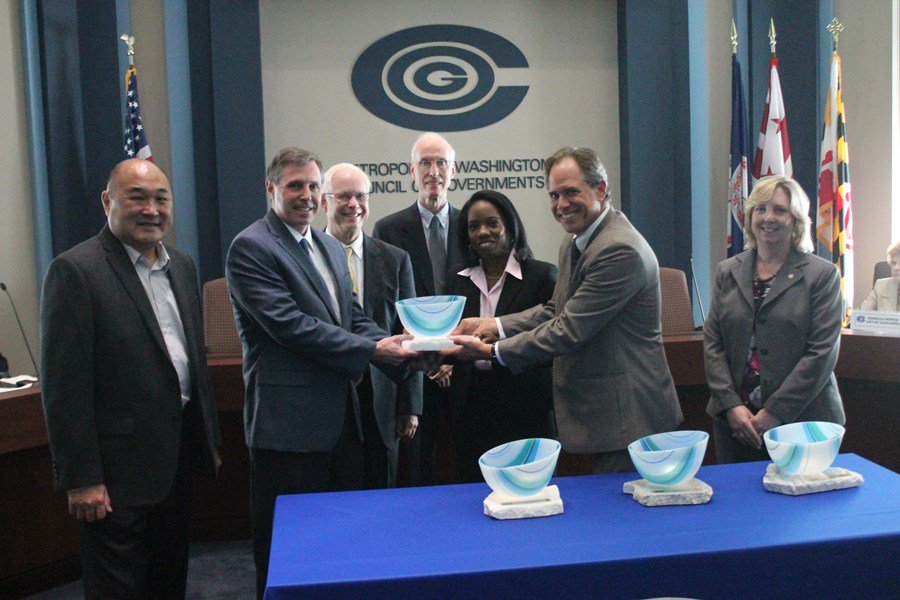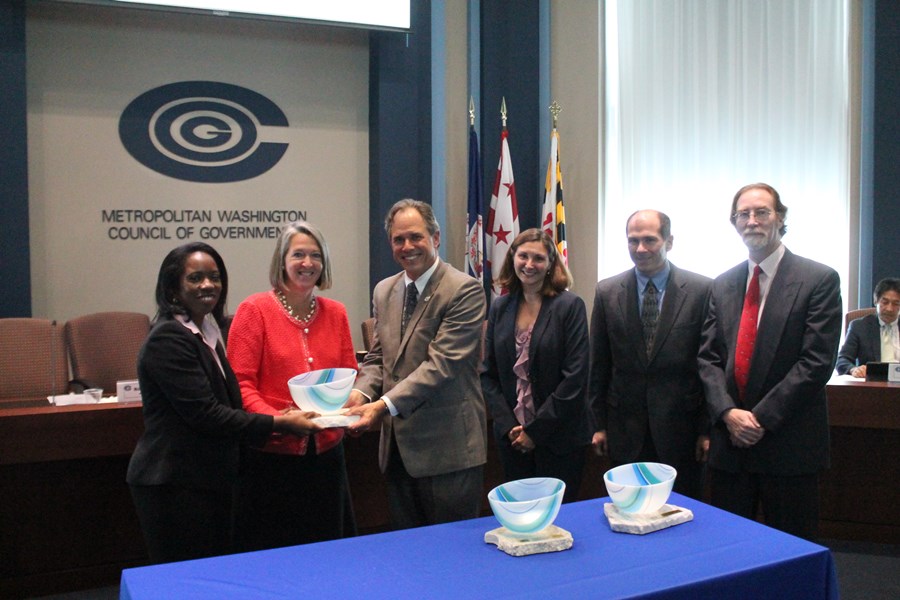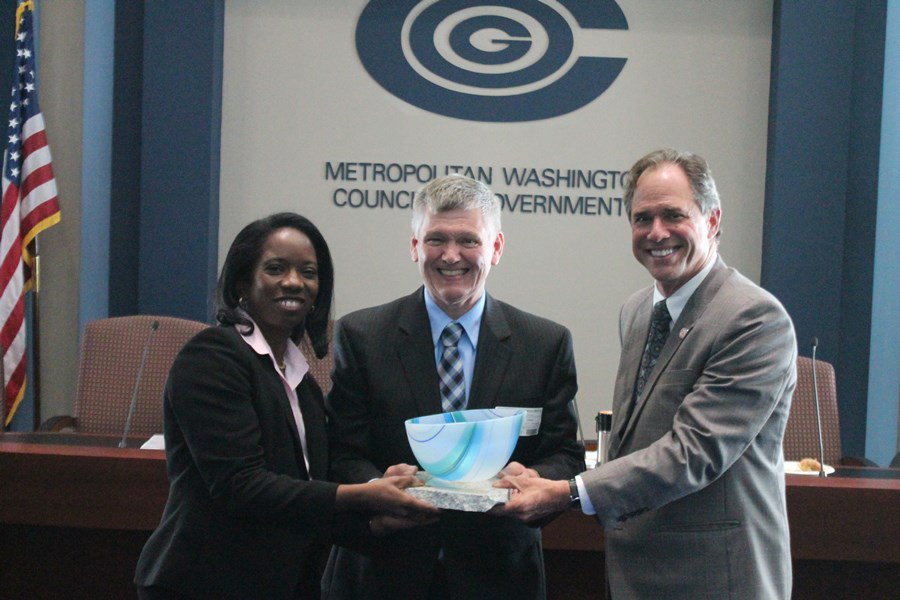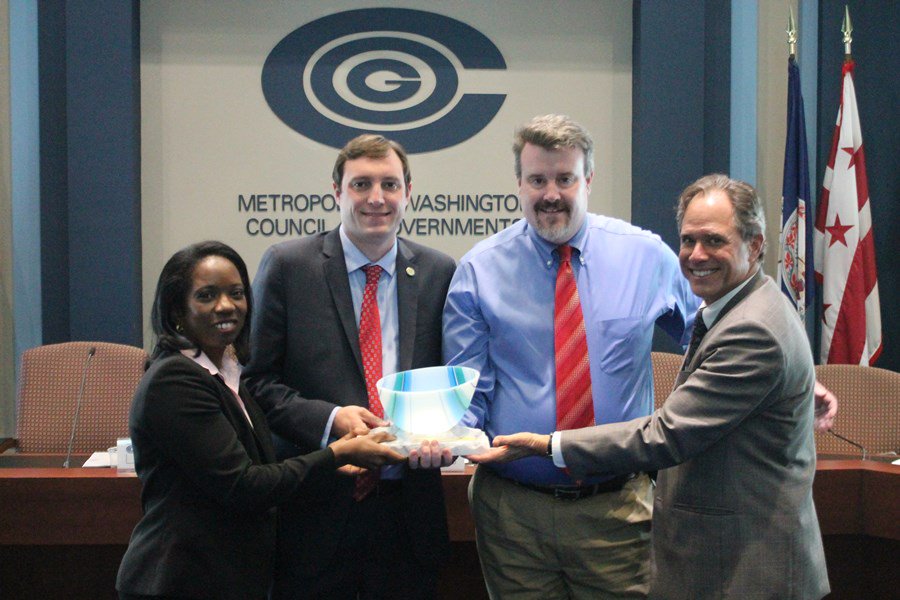Washington, DC – The Metropolitan Washington Council of Governments presented the First Annual Climate and Energy Leadership Awards to the City of Falls Church, the City of Rockville, Prince William County, and Loudoun County Public Schools for their outstanding efforts to reduce greenhouse gas emissions and increase energy efficiency. The awards recognize and encourage local actions to advance the regional climate and energy goals established by leaders at COG.
The awards were distributed at the October COG Board of Directors Meeting by Montgomery County Councilmember and COG Climate, Energy and Environment Policy Committee (CEEPC) Chairman Berliner and U.S. Environmental Protection Agency Chief of Staff Gwendolyn Keyes Fleming. The awards were given out in tandem with the release of the COG 2014 Climate and Energy Progress Report, which compares Metropolitan Washington’s energy efficiency with similar sized regions around the country. The D.C. area leads the nation in energy efficient building space and is home to the highest number of LEED-certified buildings, EPA Energy Star rated floorspace and hosts the highest number of EPA Green Power Partners.
Berliner noted, “as you can see in the report, our strong leadership is showing. We are at or near the top of nearly every category examined, including having among the highest adoption rates for Energy Star Buildings, LEED, and EPA’s Green Power Partners and Green Power Communities.”
The report found the region is fast nearing our goal of 5,000 solar roofs, with the number of renewable energy system capacity growing by more than 100% over the past year and that the region is, poised to continue this growth as Frederick and Loudoun Counties, and elsewhere, implement solarize programs. It also found that communities are encouraging building energy benchmarking and addressing climate preparedness and resiliency.
These types of efforts are mirrored by today’s awardees. Below is a description of the projects awardees pioneered in their jurisdictions:
City of Falls Church:
In September 2013, the City of Falls Church became an EPA Green Power Community (GPC) and was the first to do so in Virginia. This achievement resulted from an effective partnership among the City, Dominion Virginia Power (DVP), and 3Degrees to publicize and recruit City businesses and residents to purchase renewable energy. The EPA renewable energy target for the City was 4,371MWhs or 3% of the community’s total energy use. The environmental impact of the green power is equivalent to removing more than 3,000 tons of carbon dioxide from entering the atmosphere. Having reached the GPC targets with limited resources, the City was able to demonstrate that a meaningful achievement regarding the complicated subject of energy and climate change is available to any small jurisdiction.

City of Rockville:
Rockville’s green building and energy initiative promotes greener and more efficient commercial, residential and municipal buildings. The main elements of the initiative include green building regulations adopted in 2010 and updated in 2012; incentives such as the High Performance Building Tax Credit for Existing Commercial Buildings; an energy policy for municipal facilities and operations with a 15 percent electricity reduction goal and a 20 percent renewable energy generation goal ; and education and outreach. Rockville has over 4.6 million square feet (sf) of LEED certified space; 7.2 million sf of ENERGY STAR space; and over 300 LEED professionals. Overall electricity consumption by properties located in Rockville zip codes has decreased by 40 million kWh between 2009 and 2013.

Prince William County:
The Prince William Landfill Gas to Energy Project was put into service on October 28, 2013. The power plant expansion was completed on time and on budget. The five engine facility now generates 6.8 megawatts, meeting the electricity needs of 5000 Prince William County households. Before this expansion project, approximately 25 percent of the methane gas was used by the engines. Now 90 percent of the methane gas is used by the engines and the remainder gas being flared has low methane content not suitable for energy recovery. The energy generated will meet over one percent of Northern Virginia Energy Cooperative’s (NOVEC) total annual requirement. In addition, the County receives a portion of the proceeds from the energy sales, which help offset the cost of landfill operations, another win for Prince William County taxpayers.

Loudoun County Public Schools:
Loudoun County Public Schools’ Energy and Environment Program began in 1993. Over 50 schools have earned the ENERGY STAR rating (representing over 60% of their schools and 5.3 million square feet). Over the last 19 years, LCPS has saved over $54 million on utility costs. The cumulative dollar savings is equivalent to hiring over 1,200 first year teachers, or educating over 4,700 pupils for a year, which is significant to taxpayers in Loudoun County. During that same time, energy use reductions represent the elimination of over 290,000 metric tons of carbon dioxide emissions. This is equivalent to removing 52,000 cars from the road for a year or planting 7.5 million tree seedlings and growing them for ten years.

Visit the Climate and Energy Leadership Awards page to learn more.